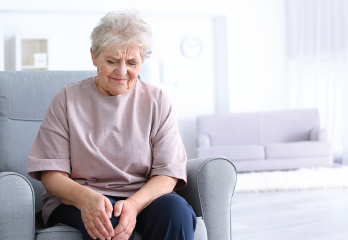
Africa Studio / shutterstock.com
Mounting evidence suggests that humans have a complex and integrated mind-body system. Knee problems may affect the spine and other body parts, but also the mind—and vice versa. This is the wisdom of Ayurveda, the 3,000-year-old traditional medicine from India.
A team of researchers from Germany recently undertook a study, titled “Effectiveness of an Ayurveda treatment approach in knee osteoarthritis—a randomized controlled trial,1” which appears in the May 2018 edition of Osteoarthritis and Cartilage.
Christian S. Kessler, MD, works in the Department for Complementary and Integrative Medicine at Charité University & Immanuel Hospital in Berlin, Germany. Along with colleagues from multiple countries, Dr. Kessler delved into the issue of how Ayurveda, widely used in India for a variety of ailments, is able to move the needle on the pain of osteoarthritis (OA).
He says, “Our institute is one of Europe’s largest facilities for the study and practice of complementary medical research. While I have been interested in traditional Indian medicine—Ayurveda—for over 20 years, it is only lately that clinical research on this multimodal practice is on the rise in the West. Given the need for concrete data according to the principles of evidence-based medicine, we thought it would be wise to undertake a randomized controlled trial.”
Why OA?
“Knee OA has a high economic burden and prevalence in Western countries and worldwide,” Dr. Kessler notes. “We took care to undertake a well-designed study that was adapted to the specifics of Ayurveda. Plus, in the case of OA, there is a substantial overlap between the Western diagnosis of OA and the diagnostic entity in Ayurveda known as sandhi-gata-vata. Ayurveda is not only nutrition and lifestyle, but an entire sophisticated medical system that makes use of a multimodal approach to individualize treatment according to Ayurvedic principles. While there has been previous clinical research purporting to address Ayurveda, almost all of these trials actually left out certain elements of Ayurveda therapy. This is our attempt to rectify that.”
In what was the first randomized controlled confirmatory study on the use of multimodal Ayurveda to treat knee OA, researchers enrolled 151 individuals (77 in the Ayurveda group and 74 in the conventional care group). Participants in the conventional group received multimodal and individualized conventional care for knee OA according to current guidelines. This included quadriceps muscle-strengthening exercises; knee-specific physiotherapy, including manual therapy; occupational therapy; advice for home knee exercises; dietary advice for weight loss for overweight participants; and, if necessary, administration of long-term pain medication according to current guidelines. The study, a head-to-head comparison between Ayurveda and conventional guideline-based OA treatment, did not include a placebo or a sham intervention.
